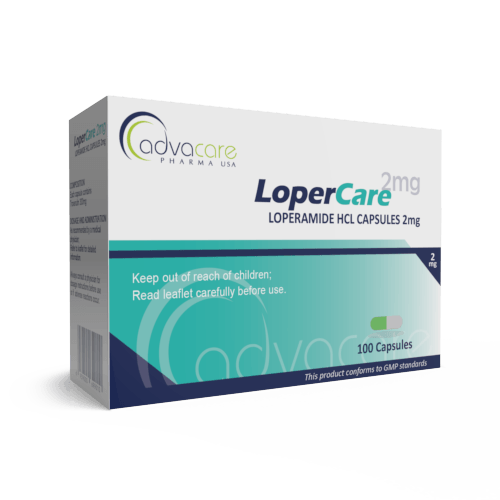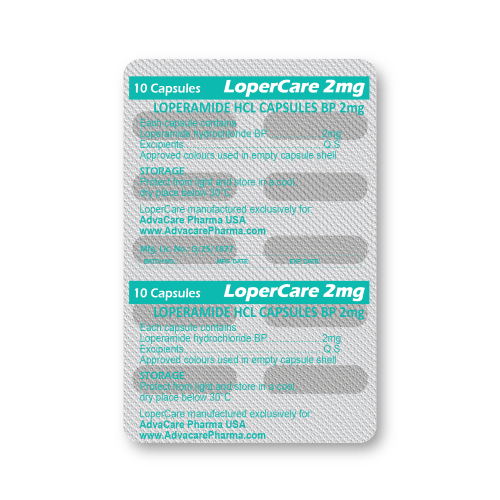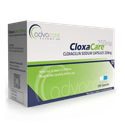- Home›
- Pharmaceuticals›
- Capsules›
- Loperamide Capsules
Loperamide Capsules
Dosage
Packaging
What is Loperamide?
Active Ingredients: Loperamide
Loperamide HCl Capsules are a drug used to control and relieve symptoms of acute, nonspecific diarrhea (including traveler's diarrhea) and chronic diarrhea caused by gastroenteritis or inflammatory bowel disease. This medication is also used to lower the amount of discharge caused by ileostomies.
Loperamide HCl is classified as an antidiarrheal agent. The active ingredient works by slowing the motility of the small intestines, which gives the intestines more time to absorb fluid and nutrients from food.
Loperamide is a synthetic phenylpiperidine opioid that acts as a potent mu-opioid receptor agonist. Due to its highly lipophilic properties, it does not usually cross the blood-brain barrier at normal therapeutic doses. At high doses, P-glycoprotein-mediated drug efflux may be inhibited, allowing loperamide to cross the blood-brain barrier and exert CNS effects and toxicity.
Loperamide acts on the opioid receptors that regulate gastrointestinal signaling, motility, and fluid and electrolyte balance. The agonism of these receptors increases the gastrointestinal system’s absorption of fluids and electrolytes by decreasing peristalsis and fluid secretion, delaying colonic transit time, and increasing the tone of the rectum and anal sphincter. Clinically, this results in a reduction in daily fecal volume, increased fecal viscosity and density, and a reduction in incontinence and urgency.
If loperamide reaches high plasma concentrations, it can interfere with cardiac conduction due to its inhibition of voltage-gated Na+ and ether-a-go-go K+ cardiac channels. This interference can prolong the QRS complex and the QTc interval, which can cause adverse cardiac events.
AdvaCare Pharma's Loperamide HCl Capsules are manufactured in GMP-certified facilities located in China, India, and the USA. We routinely inspect our production facilities to ensure our products meet health, safety, and environmental standards.
Why are we a quality Loperamide manufacturer?
AdvaCare Pharma is a GMP manufacturer of Loperamide Capsules. Our strategically located facilities ensure that our company has complete control over the supply chain, meaning higher quality products and lower costs for production, transportation and importation. Over the past 20 years, we have built a solid reputation as a leading Loperamide manufacturer, one of the 60+ products we manufacture in capsule dosage form, across 65 countries where our pharmaceutical products are distributed.
Uses
What is Loperamide used for?
It is used for the relief of acute, chronic, and sudden diarrhea (including traveler's diarrhea). Loperamide is indicated for the treatment of acute, nonspecific diarrhea in children (≥ 2 years) and chronic diarrhea in adults.
Loperamide is also used to reduce discharge for people who have an ileostomy and for people with gastroenteritis or inflammatory bowel syndrome (IBS).
How are Loperamide HCl Capsules used?
This medication is manufactured to be taken orally. Loperamide HCl Capsules should be taken with a full glass of water. The capsule’s contents may be mixed with small amounts of water, applesauce, or pudding and swallowed. Drink plenty of water and replenish electrolytes during treatment to prevent dehydration caused by diarrhea.
What dose should be taken?
For the treatment of acute diarrhea in:
- Adults and Children (≥ 12 years old): the recommended initial dose is 2 capsules (4mg) followed by 1 capsule (2mg) after each loose stool. Do not exceed 8 capsules (16mg) in a 24-hour period. Clinical improvement is usually observed within 48 hours.
- Children (6-8 years old; 20-30kg): the recommended initial dose is 1 capsule (2mg), twice daily (4mg daily dose). On the second treatment day, the recommended dose is 1mg/10kg of body weight administered only after a loose stool and not exceeding the initial dose (4mg).
- Children (8-11 years old; > 30kg): the recommended initial dose is 1 capsule, three times daily (6mg daily dose). On the second treatment day, the recommended dose is 1mg/10kg, administered only after a loose stool, and should not exceed the initial dose (6mg).
For the treatment of chronic diarrhea in adults, the recommended initial dose is 2 capsules (4mg) followed by 1 capsule (2mg) after each loose stool. Once diarrhea is controlled, the dosage should be reduced to the minimum required to see positive effects.
The optimal dose can then be administered as a once-daily dose or divided doses. Do not exceed 8 capsules (16mg) in a 24-hour period. Clinical improvement is usually observed within 48 hours. The average maintenance dosage needed is usually between 4 and 8mg daily. If clinical improvement is not observed after 10 days at 16mg/day, loperamide is unlikely to control symptoms but may be continued if diarrhea cannot be adequately controlled through other means.
Loperamide overdoses may cause toxic effects, including CNS depression, hypotension, urinary retention, and paralytic ileus. Treatment with naloxone may reverse opioid-related toxicity, including CNS and respiratory depression and hypotension.
Refer to a doctor or pharmacist for more specific guidelines on dosage. Do not exceed what they advise.
Who can use Loperamide?
Loperamide can be administered to adults and children (≥ 12 years), but caution is advised for specific groups of patients.
Pregnant Loperamide HCl is a category C pregnancy risk. Animal studies have shown no evidence of teratogenic activity. Some animal studies have found evidence of impaired fertility and impaired offspring growth and survival at exceedingly large doses. There are no adequate and well-controlled studies on pregnant women, so the risk of teratogenic effects in humans is unknown.
Nursing Loperamide may be excreted in human milk in small amounts. Loperamide is contraindicated for pediatric patients < 2 years old and its use during nursing is not recommended.
Pediatric The recommendations for dosage adjustments for children are as follows:
- In pediatric patients < 2 years old, loperamide use is contraindicated due to the risk of serious cardiac adverse reactions, as pediatric patients may be more sensitive to its CNS effects than adults. Cases of cardiac arrest, syncope, and respiratory depression have been reported. Rare cases of paralytic ileus associated with abdominal distention have been reported.
- In pediatric patients ≥ 2-12 years old, loperamide use is not recommended due to the variability in responses which can be worsened by dehydration, particularly in pediatric patients < 6 years old.
Loperamide’s safety, efficacy, and therapeutic dose in treating pediatric patients with chronic diarrhea has not been established.
Geriatric There are no formal studies on adults ≥ 65 years old that have determined whether they respond differently than adults < 65 years old. Although loperamide’s pharmacokinetic profile has not been clearly established in older adults, studies have found no major differences in drug disposition (absorption, distribution, metabolism, and excretion) between older and younger patients.
Due to loperamide’s increased potential to interact with medications that are known to increase the QT interval, loperamide is not recommended in geriatric patients taking antiarrhythmics or at risk for Torsades de Pointes.
Other warnings
The effects of hepatic impairment on the pharmacokinetics of loperamide have not been studied, and loperamide should be used with caution in such patients. The bioavailability of loperamide may be increased due to reductions in metabolism, and patients with hepatic impairment may be more susceptible to its toxic CNS effects.
Loperamide is contraindicated for use in those experiencing adverse cardiac events, those susceptible to such, and those with electrolyte abnormalities. Misuse and overdose of loperamide can lead to adverse and potentially life-threatening cardiac and non-cardiac events. Reported cardiac events include QT/QTc and QRS interval prolongation, Torsades de Pointes, Brugada syndrome and other ventricular arrhythmias, syncope, cardiac arrest, and death. Cases of syncope and ventricular tachycardia were reported in adults taking the recommended dosage.
Loperamide is contraindicated in individuals with:
- Abdominal pain in the absence of diarrhea
- Acute dysentery, which is characterized by blood in stools and high fever
- Acute ulcerative colitis
- Enterocolitis caused by invasive bacteria, including Salmonella, Shigella, and Campylobacter
- Pseudomembranous colitis (Clostridium difficile) associated with the use of broad-spectrum antibiotics
Individuals with diarrhea often experience fluid and electrolyte depletion from dehydration and should replenish water and electrolytes due to loperamide’s potential to cause adverse cardiac and gastrointestinal events.
Patients with AIDS and infectious colitis who are taking loperamide should discontinue therapy immediately at the earliest signs of abdominal distention, as this could indicate a rare, life-threatening case of toxic megacolon.
Side Effects
As with all pharmaceuticals, some unwanted effects can occur from the use of Loperamide HCl Capsules.
Common side effects include, but are not limited to:
- dizziness
- drowsiness
- constipation
- mild stomach pain
- mild skin rash or itching
Seek medical attention if the following develop:
- unusual tiredness or weakness
- signs of an allergic reaction
- stomach pain or bloating
- abdominal swelling or bulging
- worsening symptoms
- fainting
- a rapid or irregular heartbeat
- severe, bloody, black, or watery diarrhea
- severe skin reaction
For a comprehensive understanding of all potential side effects, consult a medical professional.
If any symptoms persist or worsen, or you notice any other symptoms, please call your doctor immediately.
Precautions
Do NOT use Loperamide Hydrochloride Capsules if:
- You are allergic to loperamide or any of its ingredients.
- You have stools that are bloody, black, or tarry.
- You have diarrhea that is caused by taking an antibiotic.
Loperamide should be used with caution in certain conditions, such as inflammatory bowel disease, bacterial enterocolitis, or when fever is present, a physiological response often indicative of an underlying infection or inflammatory process.
Possible interactions may occur with other pharmaceutical products, especially Class 1A (quinidine, procainamide) and Class III antiarrhythmics (amiodarone, sotalol), antipsychotics, antibiotics, or any others known to prolong the QT interval (pentamidine, methadone). Consult with a doctor or pharmacist about any medications and supplements you are taking before beginning treatment.
Loperamide 2mg: Why the most common dose?
Loperamide 2mg with the typical dosing regimen being 2 capsules (4mg) initially, followed by 1 capsule (2mg) after each loose stool. This regimen provides rapid relief and reduces the frequency of bowel movements, effectively managing symptoms with minimal side effects.
References
Effect of Adjunctive Loperamide in Combination with Antibiotics on Treatment Outcomes in Traveler's Diarrhea: A Systematic Review and Meta-Analysis
This is a meta-analysis conducted through searches of electronic databases with different clinical trials. It included 9 studies that consisted of 12 different adjunctive loperamide-antibiotic regimens. Six studies compared antibiotics alone versus antibiotics in combination with loperamide in cases of traveler’s diarrhea, the odds of clinical cure at 24h and 48h favored combination therapy, with summary odds ratios of 2.6 (95% confidence interval, 1.8–3.6; P=.20, by χ² heterogeneity statistic) and 2.2 (95% confidence interval, 1.5–3.1; P=.20, by χ² heterogeneity statistic), respectively.
The conclusion of this study is that antibiotics with adjunctive loperamide offer an advantage over antibiotics alone at decreasing diarrhea.

You might be interested in...
Why AdvaCare Pharma?
As an industry leader, we are aware of our responsibility to provide affordable and sustainable solutions to improve healthcare worldwide.











